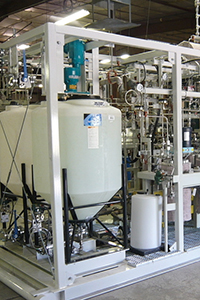Renewable Fuel from Algae
Process efficiently turns algae into biocrude oil
(January 2015)

This pilot plant in Colorado uses a PNNL-developed process to turn algae into biocrude oil, which in turn can become renewable aviation fuels, gasoline and diesel using conventional refining. PNNL received an award from the Federal Laboratory Consortium for working with a commercial partner to transfer this technology to market. Image courtesy of Genifuel. Enlarge/expand Image.
Scientists and engineers at Pacific Northwest National Laboratory have created a process that produces biocrude oil minutes after they pour in a slurry of green algae. This is one of the latest innovations PNNL's Institute for Integrated Catalysis has successfully driven to the market with the help of commercial partners. As a result, the Federal Laboratory Consortium has honored the Department of Energy national laboratory with a 2015 Excellence in Technology Transfer award. The consortium is a nationwide network that encourages federal laboratories to transfer laboratory-developed technologies to commercial markets.
The continuous process uses heat and pressure to chemically and physically change the algae to biocrude, mimicking the way Earth made crude oil millions of years ago. The biocrude can then be turned into aviation fuel, gasoline, and diesel using conventional refining technology.
PNNL teamed with Utah-based Corporation to ready this technology for industry -- their collaborative research led to two joint patents. With the new designs, Genifuel built a pilot plant for Reliance Industries Ltd. in Colorado, where the company plans to test the technology before producing renewable biofuel on a larger scale.
Unlike traditional extractions methods, which separate lipids out of algae to make biodiesel, PNNL's process converts whole algae into biocrude, fuel gas and usable byproducts. This doubles the yield of biofuel from algae and cuts the cost of production by 86 percent.
The process can be applied to other forms of wet materials as well, such as sludge from wastewater, dairy farms, or food processing, increasing the potential impact of this technology. More companies have approached Genifuel about using PNNL's process.
The team recognized for transferring this process includes PNNL's Doug Elliott, Dan Anderson, Todd Hart, Andy Schmidt, and Eric C. Lund; and James Oyler, president of Genifuel Corporation. The Department of Energy's Bioenergy Technology Office provided funding to develop the algae-to-biocrude process.
The Federal Laboratory Consortium selected a total of two PNNL technologies (see SALVI) from 57 nominations nationwide to be among 16 winners. PNNL has earned a total of 81 such awards since the program began in 1984. The 2015 awards will be presented April 29 at the consortium's annual meeting in Denver, Colorado.
